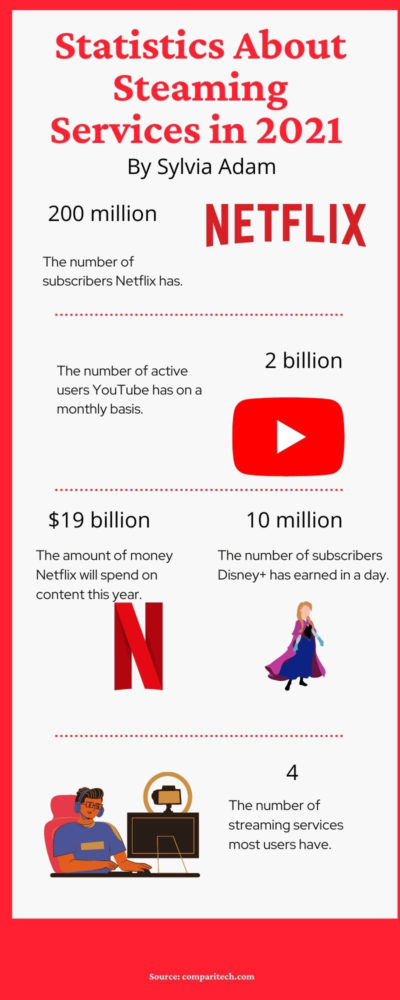Streaming services in Canada are becoming increasingly popular, which poses a financial threat to traditional cable and satellite television. They offer Canadians a wide range of content without having to follow all the rules under the Canadian Broadcasting Act.
Gordon Gow, an instructor at the University of Alberta, says streaming services don’t have to contribute money to the Canadian Media Fund and that’s an issue.
“They don’t necessarily have to contribute to the Canadian Media Fund, which is intended to support the creation of Canadian content. That’s a growing concern in Canada, that these services aren’t paying into that fund.”
Adam Thom, a film director for GOODWORK Studio, sees streaming services as a great addition to the film industry.
“I think they’re a great addition for the changing environment of the film industry, especially now with COVID. If we had not had all these streaming services, the likelihood of getting content made or even picked up and seen wouldn’t be a thing.”
Thom adds that streaming services allow new filmmakers’ voices to be heard and their stories to be told.
One trend that has been seen with streaming services is specialized content.
Gow says there’s going to be more competition for consumer dollars when it comes to streaming services.
“I think there’s going to be growing competition for consumer dollars with streaming services because it’s quite expensive to be able to pay for multiple services coming into your house.”
Gow adds that streaming services are likely going to be forced into competing for scarce consumer dollars.
Another trend that has been seen with streaming services is they’re starting to create their own content.
Thom has seen this trend happen with Netflix, CRAVE and HBO.

“I see a trend of them starting to produce their own content. Netflix originals, CRAVE originals, HBO originals, versus just picking up a show. If I make a feature film tomorrow, there still is a conversation able to happen with the streaming platform to buy the content, but I see them starting to create their originals a lot more from conception to distribution.”
Thom says Netflix and HBO are known for creating original series. For example, HBO has the Game of Thrones series and Netflix has a lot of Academy Award-winning features.
Both Gow and Thom think streaming services should be paying taxes in Canada. However, Gow is concerned about how Canadian content producers will fare in an international market if streaming services start paying into the Canadian Media Fund.
“I do have concerns that if they are paying into the Canadian media fund, there will be growing difficulties for Canadian content producers in the international marketplace.”
In the future, Gow can see more streaming services coming out online.
“In the short term I see proliferation of services. So, more of them coming online. I don’t know how many there are right now, but there are probably dozens. I think over time they’ll consolidate into a smaller number of conglomerates that compete against each other.”
Gow adds that he can see multiple streaming services being reduced to three or four and then being owned by large companies like Netflix or Disney. Netflix and Disney would purchase the smaller streaming services and incorporate them into their own service, according to Gow.
This is the only way Gow can see streaming services surviving in the future.
Thom sees the demand for content growing in the future.
“I think what’s going to happen is the demand for content is going to continue to grow. Everybody’s got their own version of Netflix. Netflix created this model that now every company, even up to Amazon, has now adopted too because it works. The great thing about it for filmmakers, specifically Alberta filmmakers, is it allows us to get our stories told.”
Challenges that arise with streaming services are a lack of compensation and working in a small market.
Gow says there’s a concern regarding compensation in the music industry when it comes to streaming services like Spotify and Apple Music.
“Music streaming and artists have a great deal of difficulty with the compensation levels on things like Spotify and Apple Music, yet also one of the challenges is regulatory, as that’s getting these companies to contribute to Canadian talent development.”
Gow adds he’s uncertain whether the market will be able to financially support Canadian productions.
Thom says Canadian streaming services have to try harder to produce better content than their United States counterparts.
“The challenge as a whole in Canada is we don’t have a huge business model like the U.S. So, we have to think a lot more about how we can tell better stories to bring some eyeballs, but also, how can these stories kind of branch out of Canada.”
At the end of the day, the world of streaming services is ever-changing and never seems to be stagnant. The future of streaming services looks bright.



